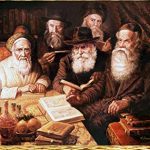Reminders: Rosh Chodesh reminders No laundry No cutting nails, hair Eat festive meal Yaleh Veyavo in Davening Yaleh Veyavo in Bentching Tehillim with commentary Elul Reminders Blow the Shofar on the first day of Rosh Chodesh for practice. Every day thereafter blow Tashrat-Tashat-Tarat after Shacharis. Recite the […]
Shavuos checklist
Shavuos Checklist 5775/2015: *The laws provided below are based on the upcoming Sefer “The Laws and Customs of Shavuos”. To browse online the content of the Sefer, including footnotes and sources, or to download a summary edition of the laws, please visit our Shavuos section provided on Shulchanaruchharav.com 1. […]
Eating dairy on Shavuos
The reasons for the Minhag What are the reasons mentioned behind eating Milk products on Shavuos? The Rama[1] writes that it is done in commemoration of the Shtei Halechem offering, which consisted of two loaves [i.e. two meals], which were brought on Shavuos. As our previous Shechita became invalid when […]
Morning Blessings when up all night
The morning blessings: According to Chabad custom one that did not sleep throughout the night is to nevertheless recite all the morning blessings himself, including washing hands with Al Netilas Yadayim[1], Elokaiy Neshama[2], Hamavir Sheiyna[3], Birchas Hatorah[4], and all the other morning blessings.[5] This however is with exception to the […]
Tachanun during Sivan
Tachanun: Tachanun is omitted from the first of Sivan until after Shavuos.[1] Our custom is to omit Tachanun until, and including, the 12th of Sivan.[2] Tachanun is resumes on the 13th of Sivan. Likewise on Shabbos of these dates Av Harachamim and Tzidkascha Tzedek is omitted. [1] 494/8; Siddur […]
Waiting six hours after eating Pareve cooked in meat pot
If Pareve food was cooked in a meat pot must one wait six hours after eating it?[1] If Pareve food was cooked in a meat pot it is permitted to eat dairy products after eating that food without waiting at all. There is no custom to be stringent. [This applies […]
Waiting 6 hours
Waiting between eating meat and milk: A. How much time must one wait?[1] Michaber:[2] Wait 6 hours: One who ate meat, whether meat of a domestic animal, or even meat of a wild animal or poultry[3], must wait 6 hours prior to eating milk products.[4] Rama No need to wait: […]
Reasons behind Basar Bechalav
The reasons for the prohibition of eating milk and meat: Others[1] explain that the true reason behind the prohibition is beyond the understanding of a human, and it is hence deemed as a “Chok”[2] by the Torah. Some[3] explain that eating milk and meat together is forbidden being that it […]
Borer-Removing bad together with good
Laws of Borer Removing the bad/waste together with some of the good/food: The opinion of Admur in the Shulchan Aruch:[1] It is permitted to remove from food which has waste in it, the waste together with some of the food, such as [using a spoon to] remove a fly from […]
Making and undoing hair braids on Shabbos
May one make or undo a hair braid [“Tzama” in Hebrew] on Shabbos?[1] It is [Rabbinically[2]] forbidden for a woman to braid her hair [or another women’s hair or child’s hair] on Shabbos.[3] It is likewise forbidden for her to undo a braid on Shabbos [even if it was made […]


